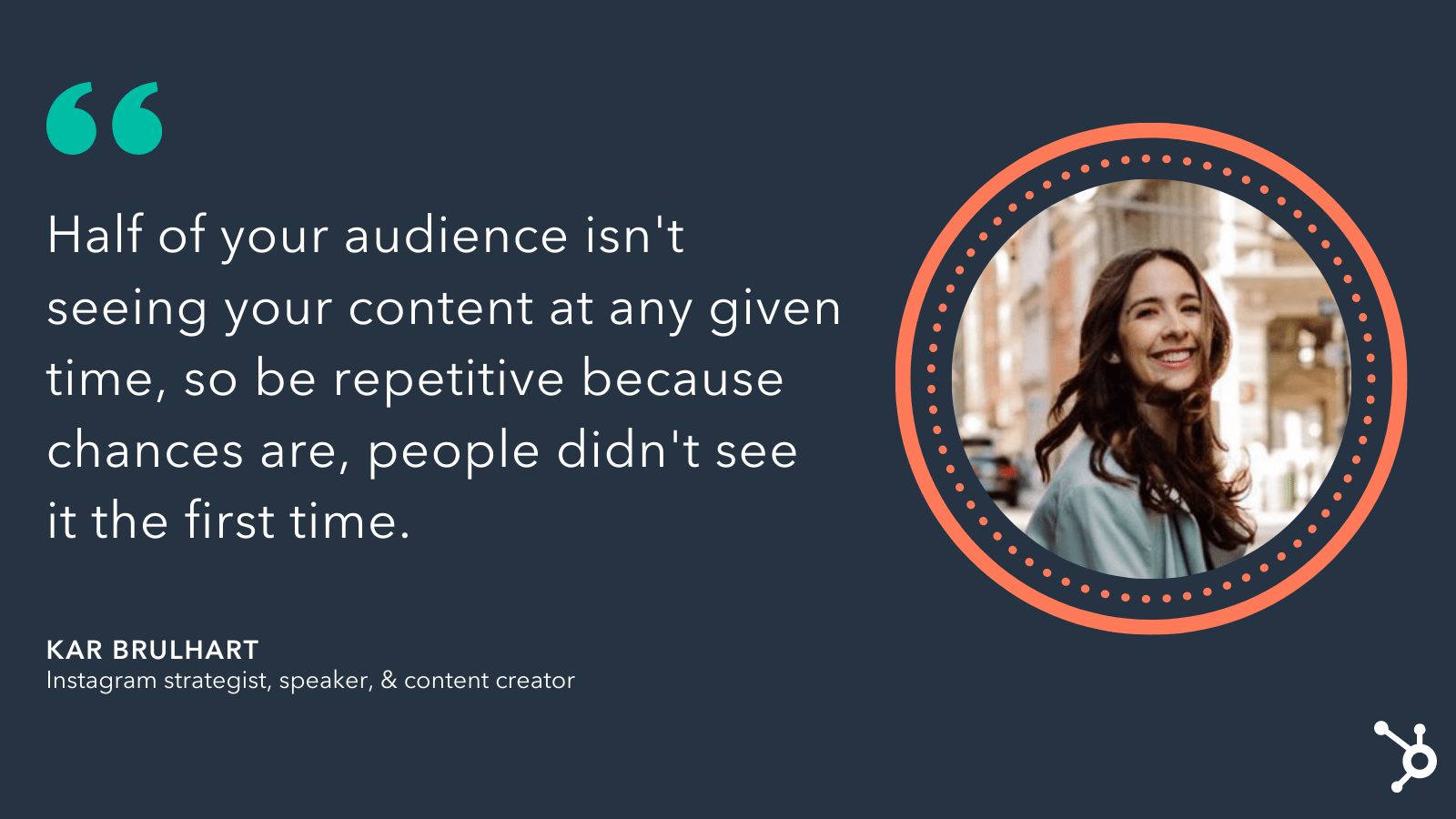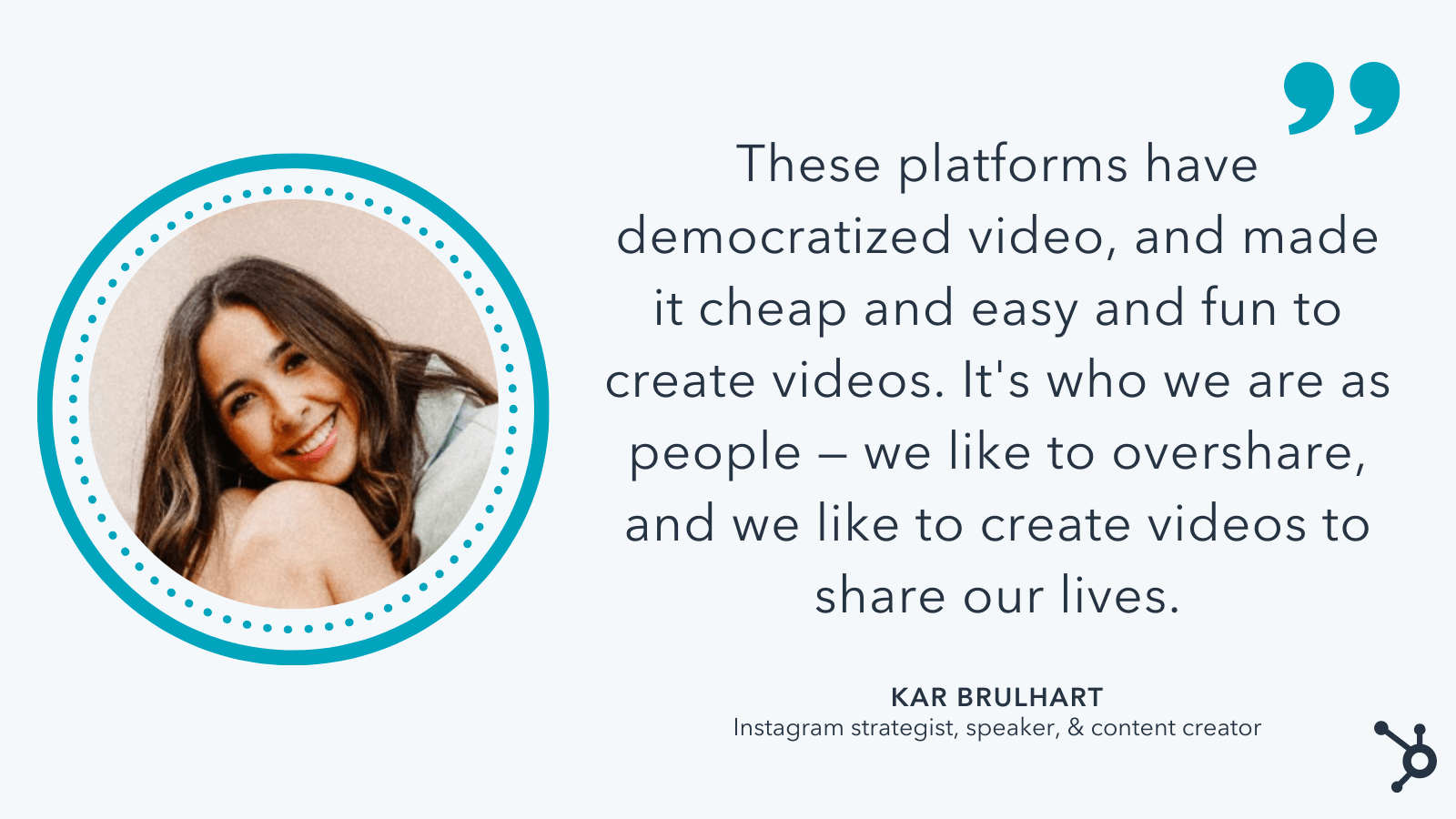
Over the past few years, TikTok has seen explosive growth, and it shows no signs of slowing down. In fact, by the end of 2022, TikTok is predicted to reach 1.5 billion monthly active users.
But there’s another big player in the game of short-form video — Instagram Reels, which Instagram launched in 2020 to provide a space for Instagram users to post short, ‘snackable’ content that mirrors what you’d see on TikTok.
We’ve already covered the debate of TikTok versus Instagram Reels, so I won’t go into that here.
Instead, I spoke with an Instagram influencer and consultant, Kar Brulhart, who has grown her own Instagram account from 0 to 45,000+ viewers and obtained over six figures in less than 10 months using Reels — all organically.
Here, we’ll cover Brulhart’s tips for how brands can leverage Instagram Reels to reach new audiences and acquire new customers.
But first — why Instagram Reels over TikTok?
The Benefits of Instagram Reels
“A lot of brands think they need to be on multiple platforms in order to have a voice and a presence, but it’s more important to get very good at one or two platforms, and have a voice and message and community there,” Kar Brulhart told me.
She adds, “We forget these platforms are about community, and we have to nurture our audiences in order to get results.”
Brulhart told me she’s decided to put all her eggs in the Instagram basket because she ultimately finds the platform more user-friendly, and there are more features and benefits for a business owner compared to TikTok.
This makes sense: Instagram is owned by Meta (formerly Facebook), which provides users with extensive advertising tools and opportunities. While TikTok is attempting to provide similarly robust advertising capabilities, it’s ultimately still in early stages and has a long way to go.
Brulhart does acknowledge TikTok has its advantages: It can serve as a great way to generate brand awareness and funnel audiences to your website or Instagram, land brand partnerships, and it can help entrepreneurs and brands keep up with trends. Her strategy is to use TikTok to post to TikTok for more brand awareness, identify buzzy trends and sounds, and then leverage that information to reach new audiences on Instagram.
Ultimately, Brulhart told me brands could be leaving money on the table if they aren’t using Reels. As she puts it, “I went from less than 2,000 followers in February 2020 to over 15,000 the next month through Reels, because Instagram is pushing Reels to new audiences. And 75% of the people who find my account are coming from Reels — compared to Stories and posts.”
If you’ve determined Reels is a viable option for your business, you might be wondering how to get started with it. Let’s dive into that, next.
(Note: These tips are from Brulhart — if you’re looking for a more high-level overview or curious how brands are already using Reels, take a look at Everything Marketers Need to Know About Instagram Reels, first.)
5 Tips for Succeeding on Instagram Reels, According to a Reels Influencer
1. Find your niche, and post consistently.
Kar Brulhart’s niche is Instagram coaching and growth, so she told me she’s focused her entire content strategy around these two key themes.
“I repeat myself often,” Brulhart says. “People get nervous about sounding repetitive, but you need to repeat yourself often, and constantly remind people of your offers.”
It can be tempting to create content on popular or trending topics even if they’re not a direct match for your product or services, but that isn’t a good idea. Social media marketing isn’t just about attracting an audience — it’s about attracting the right audience.
Additionally, posting often and on a pre-determined schedule can help you see growth on the platform, since social algorithms reward consistency. Brulhart began seeing success when she continued to post often about similar themes that mattered most to her intended audience.
2. Add context in your captions.
“Short video works really well on TikTok — like audio trends, and lip-sync trends — and what you should take away from that is you don’t have to put your entire message into a 15 or 30-second Reel,” Brulhart recommends.
She adds, “Instead, it can be something relatable and inspirational, and then in your caption, you can add that context.”
Consider, for instance, the following Reel, in which Brulhart posts a few quick text phrases in the Reel itself (like “I was bullied by a man in my first job in NYC”), but then elaborates extensively in the caption:
3. Be obsessive about your data.
As marketers, we’re already data-obsessed. Data can help you identify what’s working well, what needs improvement, and what should be ditched entirely. And your Reels strategy should be no different.
As Brulhart puts it, “I would suggest looking at your data every seven to 30 days, analyzing it, and figuring out which Reels perform well — then, take that same topic and create a carousel post, and add more context in the caption of that post.”
She says, “Half of your audience isn’t seeing your content at any given time, so be repetitive because chances are, people didn’t see it the first time.”
 A brand’s success with Reels, Brulhart believes, lies in the marketing team’s ability to experiment and use data to figure out the strategy that works best for that particular brand. For instance, perhaps your audience is more into trends and relatable content over educational Reels, which is information you can only uncover through analytics.
A brand’s success with Reels, Brulhart believes, lies in the marketing team’s ability to experiment and use data to figure out the strategy that works best for that particular brand. For instance, perhaps your audience is more into trends and relatable content over educational Reels, which is information you can only uncover through analytics.
Brulhart says, “Where I’ve seen the most success with my clients is when they aren’t afraid to pivot and change their strategies because the platform is constantly evolving, and there are always new features so it’s important to consistently test out those new features — especially because Instagram rewards those accounts that jump on the new features early.”
4. Create behind-the-scenes content.
When I spoke with Brulhart about this ‘newfound rise’ in short-form video, she reminded me it’s been a long time coming. For instance, Snapchat first came on the market with short-form video content back in 2012.
“These platforms have democratized video,” Brulhart told me, “and made it cheap and easy and fun to create videos. And it’s who we are as people — we like to overshare, and we like to create videos to share our lives.”
Post-pandemic, social media users are craving more authentic, relatable, behind-the-scenes content from influencers and brands alike.
For instance, in 2020, roughly half (42%) of Gen Zers said they wanted content described as fun— which surpassed Gen Zers’ interest in romantic content (29%) and exciting content (27%).
And, post-pandemic, 34% of HubSpot Blog Survey respondents said they still seek out more positive and uplifting content than they did pre-pandemic.
As Brulhart puts it, “It’s not about perfection or aesthetics anymore — the stories that work the best are those vulnerable, personal, behind-the-scenes content. So don’t be afraid to switch from professional aesthetic to something more approachable and fun.”
One brand that Brulhart admires for their short-form video strategy is Duolingo. The language-learning app goes viral often because they’ve begun using their owl mascot in funny, relatable TikToks (like seen below).
Humanizing your brand is a vital component of any good social media strategy. The more your audience can relate to your brand, the more they can trust your brand.
However, it’s important to note, you don’t want to copy something just because it’s a trend — it should also make sense for your brand, and feel authentic and real. As Brulhart says, “My biggest failures is when I’m just doing a trend. It doesn’t work — people smell it.”
5. Hire someone to create Reels-specific content.
If you’re interested in taking your Reels strategy to the next level, you’ll want to consider hiring someone with expertise creating engaging short-form videos for social.
Brulhart told me, “If you have the budget, hire someone who has a resume to show you they can create content specifically for Instagram or TikTok (i.e. a Reels video editor).”
If possible, you’ll want to hire someone with a proven track record on Reels who can ensure your content is appropriate for the platform and will perform well.
If you don’t have the budget to hire someone full-time, however, that’s okay, too — in that case, Brulhart told me, “Make sure your brand is tying its Reels back to your business’ content pillars. Don’t make the mistake of just jumping on a trend because it’s funny or cute … What ends up happening is you’ll get an influx of followers, but not the right followers. It’s key to make sure everything ties back to your business objectives.”
Additionally, if you don’t have the budget to hire someone full-time, consider enrolling in Brulhart’s Social Department membership, in which she sends trending audio as well as niche-specific ideas to people every week to save them time on Reels.
 You’ll also want to consider how you can leverage other content creators to help tell your story in ways you can’t think of — brand or influencer partnerships can help you with this.
You’ll also want to consider how you can leverage other content creators to help tell your story in ways you can’t think of — brand or influencer partnerships can help you with this.
Ultimately, Reels can be an incredibly powerful tool for reaching new audiences and increasing brand awareness and loyalty — but it’s not for everyone. If you’re unsure whether Reels is right for you, test it out for a few weeks and then analyze performance to figure out whether it’s worth your marketing resources.
Who knows? Maybe Reels is the missing piece in your social strategy.
Feature Image Credit: Kar Brulhart (used with permission)





